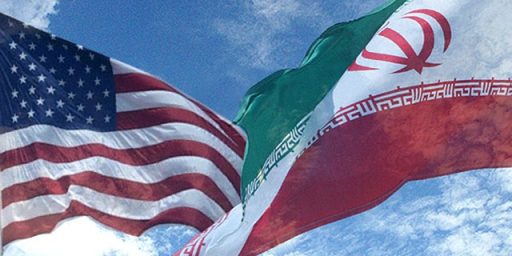George Will Slams The Weekly Standard
His column is not all that surprising since Will made a similar argument on last Sunday’s “This Week.” What is surprising, however, is the utter disdain with which Will dispatches his criticism:
The administration, justly criticized for its Iraq premises and their execution, is suddenly receiving some criticism so untethered from reality as to defy caricature. The national, ethnic and religious dynamics of the Middle East are opaque to most people, but to the Weekly Standard — voice of a spectacularly misnamed radicalism, “neoconservatism” — everything is crystal clear: Iran is the key to everything .
“No Islamic Republic of Iran, no Hezbollah. No Islamic Republic of Iran, no one to prop up the Assad regime in Syria. No Iranian support for Syria . . .” You get the drift. So, the Weekly Standard says:
“We might consider countering this act of Iranian aggression with a military strike against Iranian nuclear facilities. Why wait? Does anyone think a nuclear Iran can be contained? That the current regime will negotiate in good faith? It would be easier to act sooner rather than later. Yes, there would be repercussions — and they would be healthy ones, showing a strong America that has rejected further appeasement.”
“Why wait?” Perhaps because the U.S. military has enough on its plate in the deteriorating wars in Afghanistan and Iraq, which both border Iran. And perhaps because containment, although of uncertain success, did work against Stalin and his successors, and might be preferable to a war against a nation much larger and more formidable than Iraq. And if Bashar Assad’s regime does not fall after the Weekly Standard’s hoped-for third war, with Iran, does the magazine hope for a fourth?
As for the “healthy” repercussions that the Weekly Standard is so eager to experience from yet another war: One envies that publication’s powers of prophecy but wishes it had exercised them on the nation’s behalf before all of the surprises — all of them unpleasant — that Iraq has inflicted. And regarding the “appeasement” that the Weekly Standard decries: Does the magazine really wish the administration had heeded its earlier (Dec. 20, 2004) editorial advocating war with yet another nation — the bombing of Syria?
Neoconservatives have much to learn, even from Buddy Bell, manager of the Kansas City Royals. After his team lost its 10th consecutive game in April, Bell said, “I never say it can’t get worse.” In their next game, the Royals extended their losing streak to 11 and in May lost 13 in a row.
As expected, libs are loving this. But–I must admit–so am I: there’s nothing like a good catfight to spice things up a little. The only question is whether Kristol will indulge Will with a response.
UPDATE: For the record, I’ve already taken Will’s side of this argument.
UPDATE: Hugh Hewitt makes a persuasive argument why Will is wrong, although he never addresses the issue of timing. Kristol seems to be advocating immediate action against Iran. Hugh seems to think (as do I) that Iran can not be allowed to develop a nuclear weapon but does not take it as far as Kristol does by arguing that the current conflict in the Middle East is an opportunity to strike Iran now. And that, to me anyway, seems to be Will’s major bone of contention.






I take it that Mr. Will is upset with the use of Israel as a designated hitter in the war against Islamofascism, or the use of fatwas in interleague play, or something.
But seriously, while the liberation of Iran certainly won’t usher in an era of peace and harmony, I am nonetheless more of an advocate of direct action than realpolitik in the face of real enemies.
Although I donâ??t want to sound as bellicose as Kristol, a major source of the problem in the area is Iran. That is, a radical regime willing to export terror, with substantial financial resources. Iran is happy to use Hezbollah to legitimize its regime in the Islamic world through fighting Israel. Hezbollah is happy to win hearts and minds in Lebanon spending Iranian cash, and use weapons supplied or paid for by Iran to attack Israel. Hezbollah is greatly diminished without Iranâ??s financial support (without another patron). Its ability to harm and its ability to purchase acceptance within the local community will both be sharply reduced.
Your criticism of Israelâ??s actions is spoken like someone who has never lived in a town with municipal bomb shelters. The Government of Israelâ??s first responsibility is the well-being and safety of its people. While disproportionate to the proximate cause of the current conflict, Israelâ??s actions have exposed the threat Hezbollah poses: a well-financed and heavily armed militia, unanswerable to any government, with missiles that can reach well into heavily populated areas of Israel, with a patron that is developing nuclear weapons, and with the stated and demonstrated intent of attacking indiscriminately.
Damaging Hezbollah sufficiently could at best enable the Lebanese government to replace Hezbollah in the south, but Hezbollah will be back, because all the pieces are still present: Iranian funding and arms, a divided and weak central government, heavy Syrian influence, and a fragment of the population eager to fight Israel. If you donâ??t change the equation, the outcome is the same.
flydiveski,
I’ve got no problem with Israel going after Hezbollah, but if you think that blowing up Lebanon’s infrastructure and killing loads of civilians is going to “enable the Lebanese government to replace Hezbollah in the south,” you are living in a fantasy land.
As Will says far better than I ever can, the uprising of Hamas and Hezbollah are awful, but nonetheless a direct result of our aggressions in Iraq. Europe/Russia/China sitting on their asses isn’t helping any either but who can blame them for sitting back and laughing at us? Sure, it is shortsighted and immature, but the US making such an accusation is the pot calling the kettle black.
Post hoc ergo propter hoc.
>Although I donâ??t want to sound as bellicose
>as Kristol, a major source of the problem in
>the area is Iran.
Partially because we have so much of our military tied up in Iraq that we have no real way of stopping them from doing anything.
My argument is false because you speak Latin? Do you have anything to bring to this discussion?
If peace and democracy were breaking out all over the middle east, guaranteed that Cheney/Rumsfeld et al. would be crediting the Iraq invasion and occupation (would you be aping them?). Cheney predicted as much in ’03 and the opposite has happened. The war has clearly intensified Islamic fundamentalism in the region; just look at the Hamas and Hezbollah electoral victories. Us having 10 divisions in Iraq makes it all but impossible for us to intervene in another world crisis such as this. Soon we’ll be begging the UN to intervene. How freaking ironic is that?
So, as I said our involvement in Iraq, along with other missteps, has led directly to this and other problems in the Middle East.
I’m not computer literate enough to be able to follow what I’m supposed to do to send in a comment. Sorry! I’m happy to give you my name, but don’t want it published — if you show this use a Nom de Plume, “deep heart” (as in Texas). Thanks
“….. but the US making such an accusation is the pot calling the kettle black.”
Posted by: ModNewt at July 18, 2006 14:15
What’s the accusation??
And, What evidence do you have for this: “As Will says far better than I ever can, the uprising of Hamas and Hezbollah are awful, but nonetheless a direct result of our aggressions in Iraq.”??
A DIRECT RESULT ?? I believe C. Austin is right!
“Post hoc ergo propter hoc.”!!
Logic??